#whose idea was that??? (ours. we wanted this.)
Explore tagged Tumblr posts
Text
i started penning a post about how i always find it narratively unsatisfying when an arc ends with a conclusion the following arc breaks, regardless of how realistic the repetition of the same mistake might be, which is still true, but i actually want to talk about something else right now.
i feel like, at least at this stage, jack is in a position that is both generally unrealistic and untrue to the specific events of the series. 'jack and joker' has a clear focus on poverty and money and class issues, but it seems to treat jack in a very special way. he somehow manages to stand on the moral high ground above other characters. specifically, other poor characters. which is, first of all, a little ridiculous, since he was indeed a debt collector and, in fact, almost became the boss's son. and, second of all, is generally Not Great, because it does idolise the idea that if you "just try hard enough", you won't "allow" yourself to be backed into a corner and therefore won't have to do bad things.
now, don't get me wrong, i am not saying that our characters who have made mistakes are completely blameless. tattoo did shitty things (and hoy followed suit), safe did shitty things, hope frankly admitted to enjoying doing shitty things. however, if we zoom out a little, we will see that all these characters are in a situation that is inherently unfair to them. we have all of these poor people in immense amounts of debt and then we have this disgusting rich motherfucker whose entire wealth is literally based on making their lives as miserable and unfair as they are. and i think that, in this particular case, the series would have actually benefited from a dichotomy. don't get me wrong, i'm usually absolutely brimming with nuance and also asking "what lies outside of it?" but this shall be my exception. (though you could say that joke already brings some nuance to it - he is initially from a well-off family and he actively makes choices to the benefit of poor people, despite it resulting in him being ostracised from said family and its riches).
jack walks the line of being poor and managing not to do anything "too bad" like he is a fucking circus performer on a wire. and, don't get me wrong, he is genuinely a selfless character. he makes choices that a lot of other characters in the same circumstances wouldn't make. he remains in debt and continues working for the boss because he keeps trying to help people and pay off their debts first - that is admirable. however, he himself was already set up for more success than others. sure, being forced to become a debt collector isn't a walk in the park, but most other debtors didn't even have that choice. jack has to work for the boss in order to stay afloat - that is an undeniably hard task. the other people the boss collects debts from, however, have to come up with a lot of money out of thin air - that is not simply a hard task, that is an impossible one that is designed to trap them in the cycle of doing this impossible task forever. that being said, ultimately, jack is still poor. his own hamster wheel should be somewhere around the corner, that's always the case. this idea is where i wish they would have taken jack's arc.
from the moment when he refused to marry rose, there was no escape for him. finally, much like our other poor characters, he found himself stuck between a rock and a hard place. (and i think that it's very thematically appropriate for jack's particular "i can't do this anymore, i deserve to live a full life" sentiment to be connected to love, since he is, after all, a lead of a romance drama). he made the decision to say "no" and from that point on, he was completely and utterly fucked. because, realistically, that conversation that he had with the boss after refusing rose was insane. i don't know what he would have done to jack exactly, if that was a genuine conversation and there was no exchange of jack's freedom for the ring, but it would not have been anything good.
so i wish jack had to make the actual tough call there, instead of having joke save him all on his own (and later take the fall for it). and if it was, at least in some capacity, jack's decision to steal that ring, he would finally be placed in a situation where every other poor character already inevitably found themselves in. because the entire system is rigged against all of them and they are eventually always forced to do things that they should have never even had to consider in the first place. but they deserve better than living a life set up for them by evil rich people who literally live off of their suffering and they are allowed - no, at some point they simply have no choice but to - fight for a better life.
this, in my opinion, would have been a much more powerful message and - not to circle back to my personal preferences - would have also not left us with joke making the very same mistake that we decided we should never make again at the end of the previous arc.
40 notes
·
View notes
Text
HUENINGKAI: “I learned to love myself thanks to MOA”
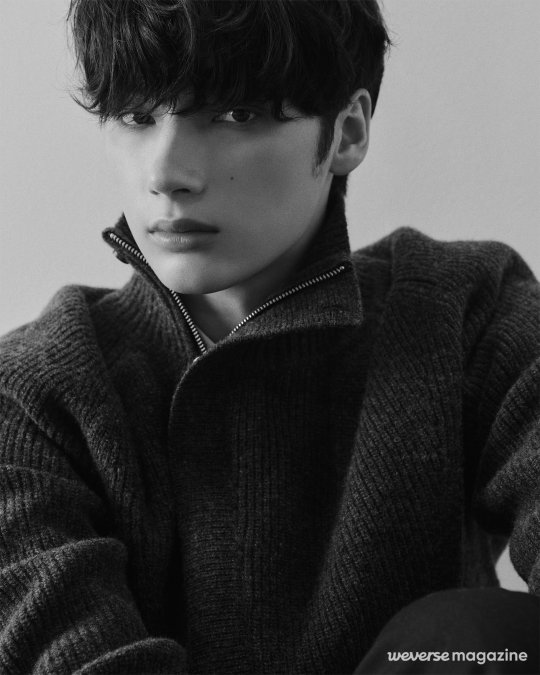
TOMORROW X TOGETHER The Star Chapter: SANCTUARY comeback interview
2024.11.13
He cleared out his favorite hoodies and learned how to handle Cubase with ease. While many things keep on changing, some things are forever constant: the music, the group, and MOA. They are the true passions of HUENINGKAI, whose confident tone reassures us of his commitment to forever.
You cleared out some of your hoodies and stuffed toys—what you called your “horcruxes.” HUENINGKAI: Well, the hoodies were way too small for me anyway. (laughs) I wanted to try out some new styles, too, so I cleared them out. I decided I needed to ditch the hoodies first and try something prettier, including buying some knit sweaters. I also felt I could do away with my old stuffed dolls and replaced them with some new fluffier ones. It’s hard the first time you get rid of stuff, but I found it gets easier after that.
You’ve made a lot of big changes in different areas. You’ve been keeping up with your exercise, even throughout the ACT: PROMISE world tour, forming the TXT Exercise Team and regularly taking “TXD” [today’s exercise done] photos. (laughs) HUENINGKAI: I always take TXD shots. I share them in our group chat. I started working out to boost my self-esteem since they say it helps, and it definitely helps keep my mind off things when all you can think about is how tiring it is! (laughs) You can’t help but lose weight if you box. It’s the only thing that makes me sweat as much as performing in concert. There’s someone on staff who’s been doing CrossFit for a long time, so I recently started too. My goal was never to bulk up and get these huge muscles in the first place but to have a slim build with lean muscles, so CrossFit seems like a good fit for me. And MOA, you don’t have to worry—I’m not going to overdo it. (laughs)
A lot of MOA were surprised the way you threw the guitar during the performance of “Growing Pain” on the ACT: PROMISE tour. HUENINGKAI: My image sure underwent a transformation. (laughs) I wanted to show how even someone like me, who’s usually so pure and soft, has some rock star inside him. I looked up different ways of capturing the idea of smashing up the stage. I initially thought about breaking the guitar, but I figured throwing it would be better. That was all I did early on in the tour, but by the time we took it to the US, I experimented a lot, throwing the pick and flipping my bangs back later on. I was happy I got to show off a different side of myself through all that.
You’ve always had a knack for playing instruments and like playing them for fun. How do feel now that your YouTube series HUENINGKAI Wants to Start a Band is over? HUENINGKAI: I love playing instruments and being in a band, so I was thrilled to be able to make it. Just holding an instrument in my hands makes me feel happy, and actually interacting with and jamming with a band felt like a quintessentially youthful experience. The whole thing was fun to shoot. It never felt like work to me. I approached it like I was going to hang out with a school band.
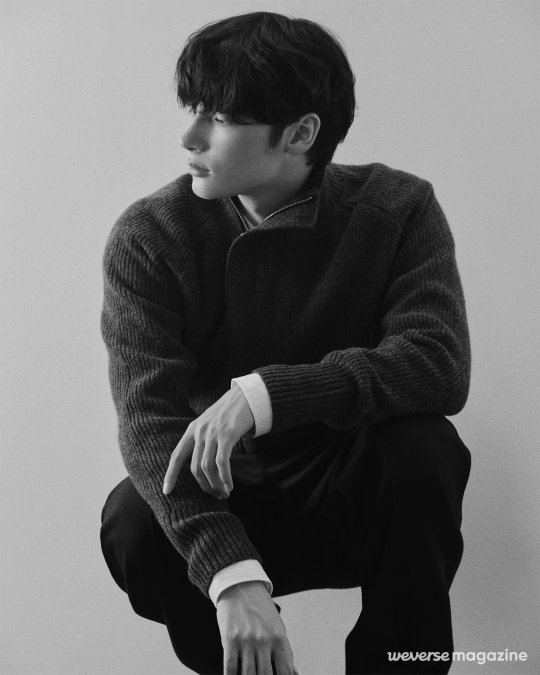
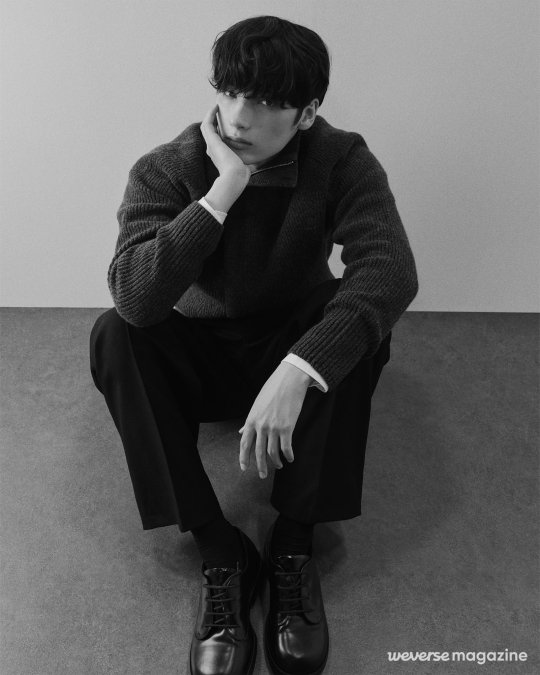
What do you think makes being in a band so uniquely appealing? HUENINGKAI: I think it comes down to the eye contact you make while playing together. I think chemistry’s the most important part of a band, and when you’re looking each other the eye and having a good time together, you feel fully united. I feel like rock has the power to make unforgettable memories for both the band playing and their audience. I heard MOA saying they’re interested in playing in bands now or want to get back into learning an instrument. HUENINGKAI Wants to Start a Band was a huge motivation for me, and it makes me happy thinking it planted the seeds for some great dreams among MOA. I hope they challenge themselves to pursue whatever they want and achieve their goals, whether that’s playing in a band or something else. Just the act of trying something new takes a lot of courage, and if they build up some experience, they can truly enjoy their youth.
What form did that sense of youthfulness take on when you were making the show? HUENINGKAI: It’s the kind of youthful experience you can only experience during your university years, full of excitement, sorrow, and happiness all mixed together. The song “Kitto Zutto” is actually supposed to be about how I felt filming the Yonsei University episode of HUENINGKAI Wants to Start a Band. I seem to remember working on it between filming episodes two and three. I tried to make the chord progression feel both bright and also have a refreshing, youthful vibe. The very first thing I made was the piano track, but it felt a bit bland, so I turned up the BPM and then it sounded great! The funny thing was that I tried to play at that higher BPM but my fingers couldn’t keep up. (laughs) Since it would’ve been a little bland with just the piano, I felt like it’d be nice to have a catchy melody, so I had a guitar riff repeat from the intro onward. That’s the main highlight of “Kitto Zutto.” The drums gradually build up the sound and create a sense of flow.
How do you think it compares to the first song you produced, “Dear Sputnik”? HUENINGKAI: I’ve grown so much since then. When I was working on “Dear Sputnik,” I didn’t know how to use Cubase, but I used it to make the song this time. It was easy and convenient once I got the hang of it and got better as I used it more and more. Actually, for “Dear Sputnik,” I created the basic structure, but I got a lot of help from other people since it was less than two years since I debuted. I really wanted to contribute a greater share after that, and I did contribute significantly more to “Kitto Zutto.” It’s the first on a path of hard work towards being able to make a song I can truly call my own.
When you had just debuted and you were on Section TV, you said, “Ever since I was a trainee, my one goal has been to make and perform songs that can move people.” To what degree have you achieved your goal? HUENINGKAI: With “Dear Sputnik,” 30%—“Kitto Zutto,” 60%. Right from when I was first writing “Kitto Zutto,” I was thinking about how fun it would be to sing it with MOA in concert. Nothing makes me feel more fulfilled than when I see MOA enjoying a song I produced. When I performed those songs in concert, I went around in front of the audience on the moving stage and could see MOA up close and personal. They all looked so happy. I’m glad I made these songs that MOA can really get into singing along with and that we can touch their hearts with. I think singing them together gives them their final touches. I want to keep making and performing songs that everyone will love and can make them feel happy when they listen to them.
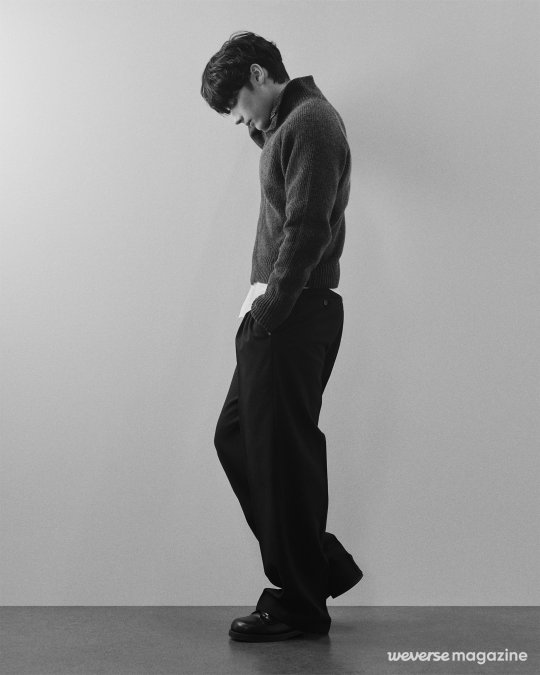
In many ways, the past year has been an excellent showcase of how you’ve grown musically. You really got people talking when you were on Lee Mujin Service and when you performed “BETELGEUSE” on the Nippon TV show THE MUSIC DAY. HUENINGKAI: I got lots of messages from people I know. (laughs) It’s the first time so many people have reached out to me like that. I was grateful but there was something indescribable about it because I feel like I’m still in the process of finding my own voice. I’ve tried singing with something more like rock vocals, and even though I don’t have difficulty hitting high notes, I’ve been thinking carefully about how to make them sound even better. I’d like to find vocals that are a little more unique to me. Obviously being a good singer is important, but I feel like sometimes that individuality is even more important.
You’ve always been a kind person, but you seem pretty strict with yourself. HUENINGKAI: Only when I feel like I’ve perfected a skill can I say that I’ve truly made it mine. I’m sort of a worrier so I practice on my own outside normal rehearsal time. Our new single “Over The Moon” is hard. (laughs) My feeling is, if you want to dance well during live shows, it starts with singing perfectly before you ever even stand up. And when I’m performing onstage, I just think, Just do it like we practiced. I might just end up making mistakes if I try to go beyond that.
I guess “Over The Moon” would’ve been hard since it’s more about making it feel romantic than unfolding a clear sense of progression. HUENINGKAI: It’s not a sad song, but it doesn’t exactly feel cheerful either, so I was aiming for a kind of longing middle ground. I start out singing softly to MOA, almost like a whisper, then add in a touch more of that longing in the chorus. I see “Over The Moon” as me removing the gravelly vocals from “0X1=LOVESONG (I Know I Love You)” featuring Seori and keeping it light.
When watching “Over The Moon,” it reminded me of “9 and Three Quarters (Run Away).” HUENINGKAI: Exactly! It’s got the same ear-tapping move on the line “whisper me my name” as in “9 and Three Quarters (Run Away),” so I ended up watching our old performances for the first time in a while. My image back with “9 and Three Quarters (Run Away)” was meant to evoke the excitement of school days, while in “Over The Moon,” I tried to convey something a little more mature, like a university student.
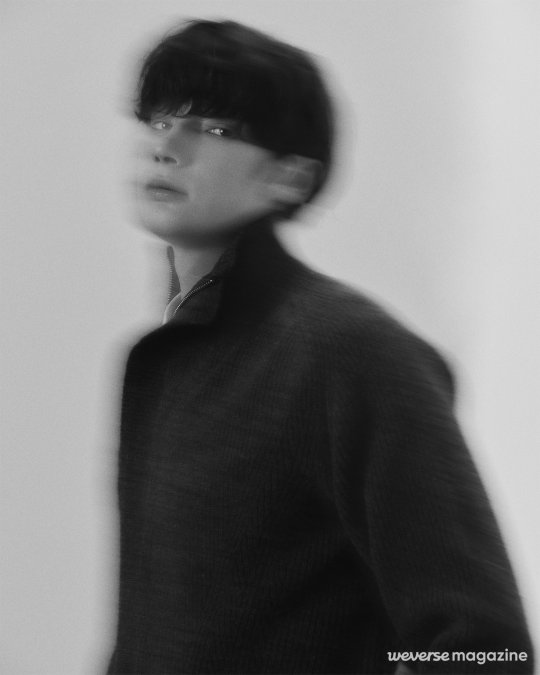
You also came across as mature the way you led the older members in the 144th episode of TO DO X TXT, “Abandoned Stars,” even though you’re the youngest in the group. HUENINGKAI: That’s probably the most they’ve ever needed me. (laughs) It was scary at first, but I helped them because I felt like they wouldn’t even be able to go in if it weren’t for me. And anyway, it was less scary the second time around. I guess it’s because I’m a levelheaded person. They were clinging to me so desperately I thought my clothes would come off. (laughs) That was a first. But on the inside I was actually kind of glad and thinking about how much they need me.
You also paid YEONJUN a visit when he was shooting the music video for “GGUM.” HUENINGKAI: YEONJUN was the first one of us to do a solo project, and since I wanted to show my support and express my gratitude anyway, I brought some dakgangjeong we could eat together. (laughs) But most of all, I really wanted to learn from him. The stage presence he had as he sang from start to finish all by himself, and watching how naturally he ad-libbed towards the end, was all pretty amazing. (laughs) His solo was a good experience for us, too.
You’ve always emphasized in interviews how you want to be dependable for the rest of the group. What does trustworthiness mean to you? HUENINGKAI: Teamwork. The greater the trust between us, the stronger our group becomes. As a member of a kind of team, it’s always my hope that the other members can continuously rely on me. That’s what being a team is, after all.
And honesty is crucial for mutual trust, of course. In an interview with W Korea, when asked what it takes for a group to last a long time, you said, “Teamwork. Being open with each other about feelings.” HUENINGKAI: I actually never used to talk much about my feelings. I thought things would just work out over time, but now I talk things over with the people I’m close to, like the other members, my family, and the protocol team, no matter what it is. I really listen to their feedback, too. It just feels better that way. But it’s not at all easy to open up about what you’re feeling inside, of course. You can never just be like that from day one. So I just started slowly, and now I’m more open than I was last year.
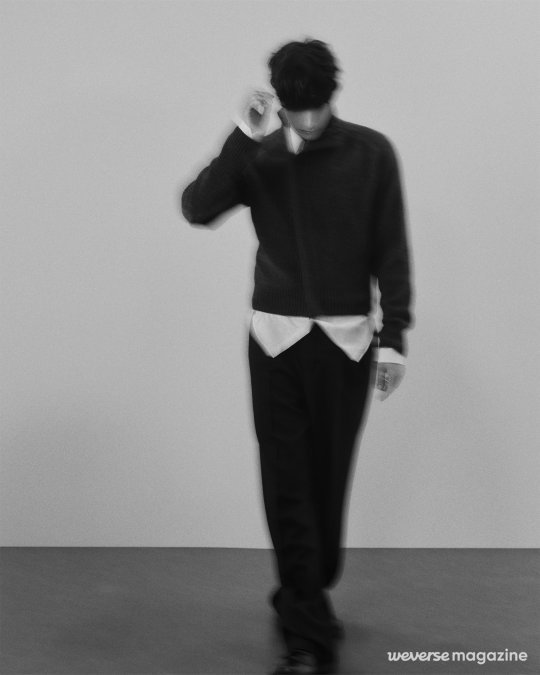
You posted a letter on weverse for the fifth anniversary of your debut, and in it you talked about how you’ve always been careful to hide your feelings away because you didn’t like to talk about them. What made you decide to open up to MOA? HUENINGKAI: I never wanted to let MOA know when I was having a hard time. I always wanted to show them the good sides only. But the longer we were together, the closer we became, and I realized that also talking about those things was the right way to further develop the relationship. That’s why I was honest and open in what I wrote on weverse on March 4. I resolved to be more honest and open from then on.
It takes a lot of courage to be open like that. How did you find it in you to find the courage? HUENINGKAI: It’s all thanks to MOA’s love. Every time MOA opens up through their fan letters or in person, I can sense their love. The phrase, “my youth is TOMORROW X TOGETHER,” is beautiful, and hearing, “I’ll love you completely for who you are, no matter what—I love you so much,” absolutely fills me with strength. All these people around me were showing me love, but I felt like I didn’t love myself. I learned to love myself thanks to MOA.
It’s clear that you have an immense amount of love toward MOA, too, like when you said, “It may have been hard doing what it took to debut, but I could do it all again 100 times if it meant I could be with MOA.” HUENINGKAI: I wanted to show them just how much I love them. There were a lot of times I felt like giving up before I debuted, but MOA helped me forget all about it. I know what it means to find happiness as an idol thanks to them. I think MOA is what’s made TOMORROW X TOGETHER whole.
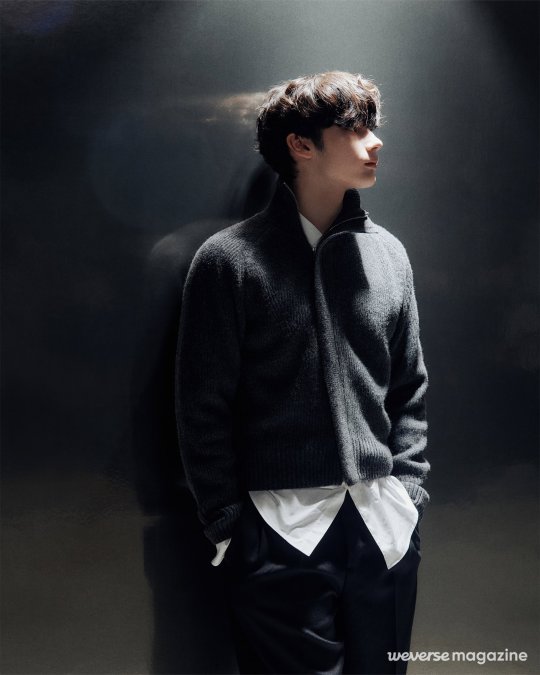
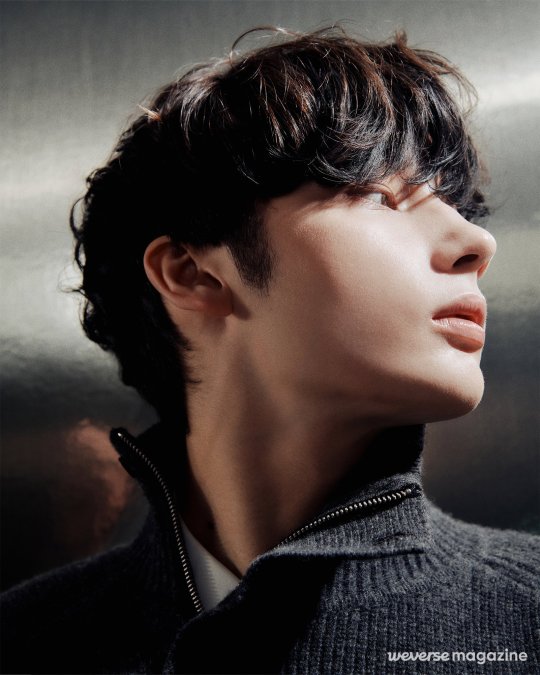
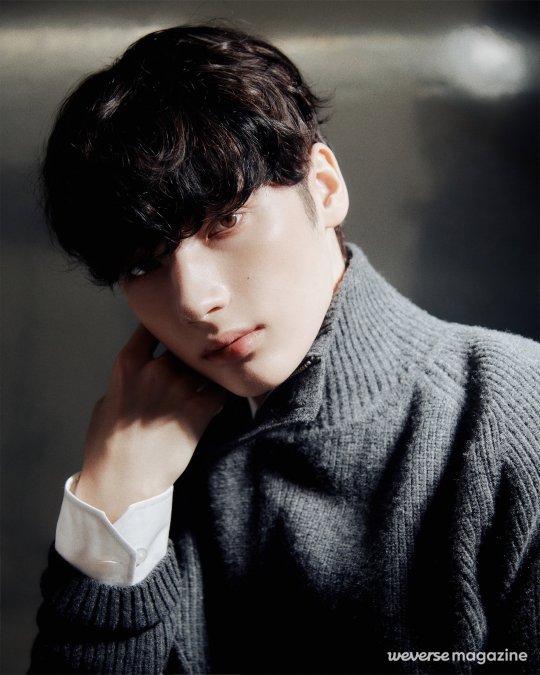
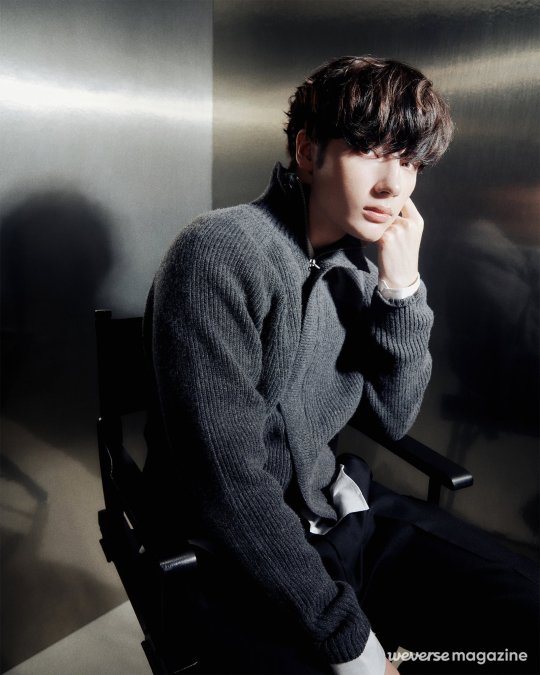
24 notes
·
View notes
Text
very important official zine stuff for real this time guys please spread this around
we realized we haven’t asked you what you want this zine to be, so here is poll with some different options for things we could do, but this still won’t set things in stone cause we’re aware that we’re working with a relatively small albeit amazing awesome and extremely appreciated audience, but it’ll give us a good idea for what direction you want the zine to go in.
some examples of what we mean for added coherence, please read before voting unless you wanna be like that guy in the Simpsons movie:
an eras tour zine (yes this is a Taylor swift joke shut up if you’re judging us you’re wrong) would be like different pieces dedicated to each, for lack of a better word, “thing” that Joel has done. @/inthelittlezine is a great example of this concept, except the mod has far better organizational skills than we ever could hope to
tourism brochure would be like we pick a specific thing Joel, such as esmp 1 or 2, or x life, or one of his hardcore/survival worlds (I haven’t listed Hermitcraft season 10 cause that’s still in progress but if you guys really really wanna, that too), and make an in universe guide to it expanding upon the lore and characters and builds and stuff. @/scarland-artbook is an amazing example of this, though of course we would be a much smaller scale of a project.
do you wanna tell a story? Or ride our bikes around the halls? We can’t help with the second one, we’re not very sporty people, but this option is both the most difficult and dangerous to the success of the zine, and the one that intrigues me specifically the most. Like, guys, I know I’m polling this, but I’m secretly hoping that this one wins. Like all the hoping. Ever. But I’m not gonna just say yeah let’s do this because if like only three people also wanna this zine will never get made and I will be really, really sad. This option is basically do we wanna take something Joel has done and work together to create an original universe/story based off of it, each contributing a small part of the story in comic or writing form. Unless you’ve been living under a rock and/or this post broke containment sorry if it did I assure I’m usually mostly sane, you probably know where I’m shamelessly stealing taking inspiration from. We heart you @/hotguycomiczine. If we went with this we would obviously create our own universe and storyline, and we’d try to base it off of one of Joel’s characters if possible. Also, if we went with this, we’d start the mod and application process and stuff and once we knew everyone who was going to be in the zine then we’d all get together and start working on the story, and this is the part I’m worried about because if we’re all stumped then I guess the zine is out of luck and I’d be sad. Also even if we did do this, like preemptively temper your expectations I am no where near as good as the legends at hotguycomiczine at organization and promotion and story writing and all that good stuff. However, if you have an idea for a story and want to share, send us an ask cause we might just end up using it.
I think the last two are mostly self explanatory.
please reblog for reach.
#smallishzine#Smallishzine boring forms n’ stuff#<this falls under the “n’ stuff” category#joel smallishbeans#smallishbeans#smallishbeans joel
31 notes
·
View notes
Text
Danganronpa V3 slander?? In my tumblr "For You" dashboard??? How did that get there? I gotta do something about this!
Alright before I tear into the shade thrown at v3 here, I would first like to say that the idea that dr1 and dr2 are criticisms of the justice system specifically is interesting and I hadn't thought about it like that exactly - Of course, they're games that deal with how punishment and crime are handled in a really small community, in very specific circumstances, but I hadn't connected it to punitive justice specifically. It's a very good analysis! Which is why, if the post was just that, I would be quite into it. But OP had to bring my baby v3 into it!
The argument being made here is actually kind of crazy to me. "The first two games in this series were about this thing, so the third one has to be about that too, and because it isn't, it's bad." God forbid franchises try new things! You know, one of the points v3 was making was that the danganronpa formula based on "hope and despair", like it was before, was running dry. But here's the thing: this point, despite what many claim, is not made in a cynical way. It turns around on itself and says "the formula is running dry, but it's final sendoff can be a love letter to itself." Let me elaborate.
Let's accept the claim that dr1 and dr2 are fundamentally about criticisms of punitive institutions. Great! See, the thing is, danganronpa v3 has aspects of criticisms of things, but it is fundamentally a game that wants to *uplift* something. Nietzsche said that, in his later works, there had to be a "yes" and a "no" - the Zarathustra was the yes, and everything else was the no. You could say that dr1 and dr2 are the "no", and drv3 is the "yes" for the danganronpa franchise.
Danganronpa v3's main themes are truth and lies. These manifest in multiple ways, like belief, trust, and identity.
These themes are explored through every chapter and character, much like how OP described danganronpa 1 and 2. The first chapter of drv3 is about an unreliable narrator, it takes the "truth and lies" angle and applies it to the pov character, showing how one deludes themself, through Kaede, Shuichi and the player. Chapter 2 takes Ryoma (who's trying to find something to believe in, something to keep him alive, but can't find it within himself once he discrovers the truth of his past) and Kirumi, who uses propagandistic rhetoric to try to get everyone else to sacrifice themselves for her. Chapter 3 deals with esoteric/religious belief. Chapter 4 and 5 take a theme that had been built up, belief in others and distrust, and take them to the extreme through Kokichi and Kaito, whose perspectives are sublated through Shuichi's character. And Chapter 6 is the culmination of all of this, one that I shall discuss now. But in the character sense, it makes them all deal with the fact that their entire personalities and memories have been crafted to make them how they are. They're "written characters". But that doesn't lessen their value as people.
I would say the word that encompasses the message of danganronpa v3 is, of course, "Fiction". Danganronpa v3 is a game whose final message is not a criticism: it is fundamentally about uplifting the power of fiction.
I find the argument that v3 "criticises something that doesn't exist" to be pretty bad faith, honestly. All of the danganronpas have unbelievable and unrealistic things in them: the whole thing about the tragedy and monokuma robots running around and the whole world being sent to hell by Junko is pretty unbelievable in real life, but we suspend our disbelief because we see the message behind it, we see the point being made. She played the system and fucked shit up because it was already fucked up in itself. The degree to which the world implodes is exaggerated and bombastic, but we get ir. The Neo World Program is also quite exaggerated. Just like the "Ultimate Real Fiction" is exaggerated in danganronpa v3. But that's the thing about fiction, isn't it! It uses scenarios that are not real to make points about real things. So, let's play the media literacy game, tumblr. Danganronpa v3 shows us an "outside world" that relies solely on killing game content for its entertainment. The audience accepts that a killing game could be done in real life and they are fine with it. What's the point here?
Without even getting into the fact that the nature of the outside world could be partly a lie due to Tsumugi's bullshit, what's important here is that this is a world whose sense of meaning hinges entirely on the killing game. And the characters of v3, despite that, still manage to make a change in this world. What v3 is saying fundamentally, is that fiction has the power to change people's mentalities, and that changing people's mentalities can change the world. V3 is saying: art can change the world. Art has philosophical and cultural value. Even in the most hopeless situation, this thing that is by all means "fake" is not devoid of meaning. Its fakeness shows the real world where meaning lies.
If you don't think that v3 is the best game in the series, that's fine, we can disagre. If you don't like that v3 is different to the other danganronpa games, that's fine. You're entitled to your preferences. If the themes didn't hit the spot for you, then that's really a shame, honestly. But don't pretend like it had to be like the other games to be something worthwhile. You can have your opinions, but when you make arguments to claim that a piece of media is bad and thematically bankrupt and I find those arguments to be fundamentally flawed, well, I have to bring up the counterarguments.
In summary, v3 is a really good game in delivering its message and themes, independently of their relationship to those of the previous games. It doesn't need to do the same thing as the prior games to have value in itself - and even still, through its purpose in uplifting fiction, it uplifts the previous two games too. It doesn't need to be about a real life institution that sucks to be able to change the world. It certainly changed mine, and I cherish this game despite its many flaws, which are not really relevant to this post.
Now since I sometimes can't tell I really hope the original post was serious because if it wasn't... lmao
my pet theory is that any danganronpa media worth its salt has to be a little bit about a corrupt bullshit orginization and how much it sucks. the first 2 games are literally about how the punitive justice system sucks fucking shit. first game shows this by every blackened having a Reason for kilking outside of "murder yaaayyy," yes even celestia, her desire for money is explained in depth from her free time events and how she grew up, everyone had a Reason. sakura's suicide was the result of societal punitive justice instead of institutional and how people who think their moral outrage is good bc its aimed at the "correct targets" will just end up hurting people. second game takes this even furthur and goes "in the first game, punitive justice was bad because all these people were victims of circumstance. can you keep those same morals when the people being subject to punitive justice ARE actual criminals of their own free will?" with the added part about the nwp explicitly being a rehabilitative justice program. kamukura's inclusion and honestly dr:0 as a whole since the whole catalyst was kamukura is just a little bit about how any kind of exceptionally smart child is propped up as Something Amazing and is basically forced to use that talent for the greater good despite any feelings the child themself may have about it or how stuck they feel or how traumatized or tortured they become in the search for and nurturing of that talent, and any child thats not that is constantly told theyre inferior to the former and Why Cant They Be Like That and are seen as lesser-than by everyone around them. ultra despair girls is also kind of about that with the warriors of hope and their backstories. dr3 and v3 fall short because they are not about that at all. dr3's future arc is a bit stronger than despair because it actually is about an institution that sucks and despair's feels too much like an interpersonal thing and All Junko's Fault when the whole point was junko just took advantage of unrest that was already there. v3 is about an Institution That Sucks however the institution is "what if you loved a murder game so much you made it real" which doesnt fucking happen. you can make approximations like comparisons to true crime, reality tv, and for a more specific example that squid game reality show. but they didnt even kill people on that. v3 is critiquing something that does not measurably exist and also it doesnt connect to even a single theme from the rest of the series. my other pet theory is that kodaka is scared of the number 3 and thats why the ones with 3 in them are like that
#danganronpa v3 killing harmony#danganronpa#danganronpa v3#writeup#No thats wrong!#Ill cut through those words!#media analysis#drv3#drv3 killing harmony#im also tagging this#kokichi oma#and also#this is personal to me#i did not think i was gonna be engaging in danganronpa v3 discourse of all things today#i hope i didnt come across like too much of a hater but op did strike a nerve by dismissing v3 so brazenly#i tried to make my post more about uplifting v3 than criticizing op#hahaha see what i did there#also i dont know what “pet theory” really means so i might just be shouting at a wall#but hey i told a friend that id explain why v3 is great and didnt deliver so its here now#also why the heck not#philosophy#yes im being a bit pedantic#im not sorry its fun
31 notes
·
View notes
Text
I'm normal and focussed on work and then I'm reminded that I am getting married in four days and a shot of adrenaline rushes through my body
#the waiting is the worst!!!#I want to just Be Getting Married so I can DO something#rather than trying to focus on work while mentally cataloging everything we Can't Forget To Bring This Weekend#it would be less stress without honeymoon RIGHT after lol#whose idea was that??? (ours. we wanted this.)#inane personal post
117 notes
·
View notes
Text
I hate being such an over thinker because anytime I write something angsty, I always worry that it sounds better in my head and is not enough angst 😩
#like my goal is to write something gut wrenching 😭#I know we are our own worst critics but I just wanna write something that moves other like music moves me#I am working on an angst fic rn#but i really want to write about another Rhysand’s sister oc whose story gives off angst#different to my other OC (Valeria)#so many ideas and I waste most of my time overthinking 😭#I also am so self conscious of my writing when it comes to actual plot lines and character development#for the same reason…overthinking#anyway sorry for my tag rambling#idk if anyone ever reads this but if you happen to be reading this…#hi lol#hope you have a good day/night 💜#hope rambles
11 notes
·
View notes
Text
Current Events in Silm fandom rlly reinforce my feeling that, despite claiming an ethos of acceptance/tolerance of anything that doesn't hurt ppl, a lot of ppl in the section of Silm fandom I frequent do follow a set of socially-agreed-upon mores about what concepts are "not acceptable" to discuss or propose (or the ways in which certain topics must be discussed to be acceptable), that you all seem to have agreed on despite the things those mores restrict not being harmful to anyone.
And when someone does say smth that violates those mores, the response is disproportionate to the amount of harm done (which is typically none, imo). I know it's tempting to say "but we just want people to be comfortable and safe", but treating ppl badly for the sin of sharing thoughts you dislike is NOT the same as preventing people from doing things that are harmful. The former is much more of a harmful behavior than the sharing of the thoughts that sets it off. Fannish etiquette, people: you shouldn’t act like someone’s meta makes them morally suspect just because you disagree with it; save the “this is morally bad” for things that are ACTUALLY harmful. We're all stuck on this website together & if you want to have any sort of community, you need to ACT like you're in a community, and that means letting other people say things you dislike. Block them if you need to! I block people all the time because i know it's better for me AND for them if we can both blog in peace.
I am not particularly comfortable with the young-queer-on-tumblr silm fandom rn due to this tendency to rebuke things that are uncomfortable rather than harmful. Maybe that's fine with you. But if your goal is to make all fans feel comfortable and accepted, you need to actually do that. If your goal is to make people who share your unwritten rules comfortable in your space, you need to admit that, and write those rules down, and curate your space so it follows them.
Edited 8:10am PST to clarify the specifics of the behavior I find concerning.
#mine#if there had been Actual Harm done i'd feel differently#but when ppl are this worked up over 'what if [female character] was Also a bad person in a way that's reprehensible to our current morals'#and start going ‘hm this person is morally suspect for their Taste In Fiction’ im like. yikes! and you do this in the War Crimes Fandom?!#and like listen i Get that esp in this fandom there's a high incidence of like. ppl who are genuinely bigoted and stuff#and it can be stressful to see stuff that reminds you of that bigotry and the way those ppl use the work to justify their own worldview#but that STILL doesn't give anyone the right to police stuff that Isn't Bigoted. that's just not how this works.#and then in terms of 'well it's not policing it's just disagreeing' i have to say. that's where Etiquette comes in and i'm frankly#unhappy & annoyed that so many ppl in my age group seem to care more about being Right than being comfortable to share a fannish space with#but again whatever maybe they don't want me in their space. that's fine! i don't want to be in your space if it doesn't want me.#but i wish they'd fucking ADMIT THAT instead of going 'ooooh we accept everyone' and then turning around#and censuring ppl whose ideas they find icky. you can't have it both ways is all i'm saying. pick one and actually do it. for all our sakes#haha i might regret this tomorrow but i'm sooooo sleep-deprived and so annoyed#sorry to my non-silm followers it's just that i'm right and i should say it
20 notes
·
View notes
Text
I will bore you all writing about Doctor Finlay, but bear with me.
One of the most unrealistic aspects of the Doctor Finlay-Nurse Meitland mess is the idea that they got engaged right before or as the war begun, and then for some reason had not seen each other ever since. Brenda has never left Tannachbrae during that time; which would have been an easier fix, had she joined up as an army nurse herself and been sent to units far from John's. I guess it couldn't be because the maximum drama of her new American fiancé living in town couldn't possibly be cut off. The western front didn't reopen till 44'.
The only possible mitigation, then, would be for Finlay to have been on the desert front, and lo and behold, upon rewatching 1x02, he tells a kid he was in the desert, then Sicily, then Italy, and finally Germany. But even on this generous scenario of the writers it doesn't make sense. If Finlay had had 6 years of ininterrupted service without leave home, chances are he'd have priority to have leave home as soon as the war ended, specially because I don't think personnel was being roaded or flown directly from Italy to Germany for obvious reasons of logistic convenience. So he would have been home on leave after may 45, and so the plot as presented is absurd.
But then it is all doubly absurd because the most reasonable and likely course of action would be for him to hear about it through letters. A dear John letter, or even someone from town condoling with him by assuming that the public status of Brenda's new engagement meant that Finlay had been informed too. What is the audience supposed to assume about their correspondence? Was he writing her tender, loving letters and receiving no response? Was he receiving tepid, general letters from her and being unconsciously or deliberately dense?
It makes no sense. Compels me though.
#doctor finlay#other highlights of the episode are evil mustache twirling snotty doctor for the rich#and rich guy congratulate themselves on what a pleasure it is to do medicine for the rich#we get our sex-related plot of the day as a poacher gets treated of hydrocele and keeps bringing game for Jane#we have dr. cameron retiring for the second time in two episodes#we have a kid whose dad went MIA 4 years ago and he keeps on shaming his mom#for trying to grieve and move on instead of holding onto hope#the series frames the kid as fanatical but then his dad comes back in the end so I guess shame on his mom#in another unsubtle plotline we are treated to the direct contrast between the pregnancy and birth care of rich vs poor#and in the remaining one the narrative toys with the idea that a girl might want to murder her just born brother#but she's just actually physically sick and the weird upsetting scenes are never explained and just red herrings#well I suppose you can construct independent meanings for each#like her destroying her new doll by dropping it a couple of floors is about her being angry at her dad#for not believing she's sick. but then she doesn't even know that she is really sick
4 notes
·
View notes
Text

y'all would Not believe the amount of drama a silly lil pet site can generate
#thread is full of people whose brains have been poisoned by capitalism to assume everything needs to strive for unrestricted growth forever#''it's 2024 & there aren't even any flash-style games!! the site is so outdated!!!'' this is a web 1.0 style nostalgia game.#you have walked into a home depot and attempted to order a milkshake#the site is run by like 4 people and some pocket lint. what do u want.#if you want constant updates and innovation & shiny flash games go play FR. it's great for that. this is not that type of game#''we deserve to know where our money is going from fundraisers!! such a small staff shouldn't need to make so much money!!''#ok well first of all why not#second of all u have absolutely no idea what web hosting costs for a site w/ any significant amount of traffic#third of all- imagine walking into target and saying you bought a tshirt there 3 years ago so this random stocker has to tell u his payrate#unhinged!!!#(ftr i am in favor of talking about pay in order to ensure fairness among peers. this is not the same thing.)#i've been annoyed about this since i saw it ok i needed to vent
2 notes
·
View notes
Text
fictional or not, dragon lore is always so interesting.
#I'm watching a DS3 lore video on the nameless king bc i wanted to figure out wtf is the dragonslayer armor's deal#but the greater lore around the dragons is SO fucking good and now I'm thinking about dragons lol#i could watch these dark souls/elden ring lore videos by VaatiVidya all day tbh#i LOVE how deep he goes with it. these worlds and their lore already feel huge but#as someone who's only played the third dark souls it rly makes me appreciate how complex and interconnected it is as a series.#sometimes i wonder if the creators ever watch these vids and think “we didn't mean all that but that's a great idea”#or if they watch it and get super happy like YES that is exactly what our subtle storytelling meant.#either way i have So so much respect for ppl who go and put together these lore videos#going as far as to look at game dumps and early releases/cut content and ALL the dialogue and item descriptions#for any one topic the lore is so scattered about and piecing together any single thing seems like such a massive undertaking.#like lmaooo i can't even follow a single questline without pulling up the wiki#a recent rabbit hole i went down too is how there are different times/realities even just DS3 takes place in?#like how in Untended Graves you see a world without light where darkness rules - and in ringed city when ur fighting those#dragons in the base of that big tree that's supposed to be the original firelink shrine and then the shrine u use is maybe The Past?#the past relative to the other shrine from the world where the flame went out w darkness ruling.#idk how the transition works from being in that one dude's garden in ur world to just walking right into the other one but idc.#just say i got twilight zoned or somethn lol. always. very interesting stuff :^} I'm not smart enough to pick up on anything in the moment#but it's SO fun watching what other people pieced together whose whole thing is that they go thru these games thoroughly.#and in a way it makes me not want to stop playing DS/ER bc there's just so much going on here that's so rewarding??#like. on TOP of the suuper deep lore the gameplay is also just super fun and u get HELLA weapons and special moves#and the modding scene has made some hella streamline tools that are so good these have been the first games I've ever MADE mods for!#like i can't think of any other games that are like this where I'm really encouraged it make it my own with such a helpful and#engaging community. I'm sure there r other games out there that are similarly engaging with deep lore and streamlined modtools#and mod communities but (〒﹏〒) 1. where?? 2. DS/ER are very beloved to me.#it's funny how little u have to know or do to beat their respective storylines. I've played them both a ton and still know so little.#and when i walk away from these lore vids I'm always like Woah 😵💫 yk? anyways.. that's my lil rant :3 back to work now
3 notes
·
View notes
Text
Part Five
Can't stop thinking about the attempt of reconciliation and reader ain't having it. Our girl is going to be wilddddd y'all. Also goodnight. See y'all tomorrow (maybe)
You call Meredith when you get home.
You. Are. Fuming. She's not sure she can ever remember a time you using so many swear words at one time.
How fucking dare them? Immature? You're the immature one? You were the one trying your best to salvage four failing relationship meanwhile none of those assholes could be bothered to try and keep one. They had one person to manage: you.
"I wanna go out this weekend." "Wear something tight and borderline risk indecent exposure."
"You know what I always say," Meredith begins. "The best way to get over someone-"
"is to get under someone else." You finish. You weren't exactly keen on the idea of bringing someone to your bed just yet, but a little attention would do you some good. "I don't want to fuck someone just yet." You admitted. "I'm more on the getting drunk and making out."
"I didn't know we resorted back secondary school heavy petting?" She teased.
"University, Dear." You corrected. "I didn't peak until after I graduated."
"No." She argued. "You didn't put your books down long enough to realize that boys actually wanted to fuck you." You were glad she couldn't see you roll your eyes. "Saturday work for you? I have a late night Friday and won't be up for it."
"That works."
"Sorry." She apologized. "I plan on getting you absolutely smashed so I need to be ready to play the nanny. I know how you love to get drunk and run off."
It was true. You had always found it hilarious when you were drunk to just run. Quite literally run away. It got to a point during university where Meredith would handcuff you to her so you didn't stray.
"I won't run." Your sober mind promised.
"Uh huh." Meredith's tone told you that she knew that was a load of shit. "I'll text Tabs. Let her know the plan."
The next day at the shop was pretty uneventful. No more unexpected visitors. You still had them all blocked. Not caring if now they decided to offer up some bullshit apology.
Months. This had been a steady decline for six months. A text or a simply sorry won't fix this. You weren't sure anything could.
But it didn't matter. You were done and they obviously were too.
You had picked up enough take out to feed a family, but you didn't plan on making your lunch before work or cooking when you got home. The rest of the week you planned on just going through the motions until you could go out Saturday and hopefully get everything out.
You weren't paying attention as you walked down the hallway to your flat. Fishing in your purse for keys. You were at almost at your door when you saw him.
Sitting next to your door was a familiar face. A face you felt you haven't seen in forever.
“What are you doing here, Kyle?" Your voice was flat as you continued to blindly try and find your keys with one hand. Fuck. You really need to clean out your purse...
“My key wouldn’t work.” He explained. "So I’m out here.”
"I'm aware why you're not in my apartment since I changed the locks," you said, trying to keep your irritation at bay. "What I am asking is why did you come here?"
"You won't return any of our messages."
"You're all blocked, so technically I didn't really get any messages." "Besides, you don't get to complain to me about not responding to texts, Kyle Garrick." Your fingers finally wraps around them. God bless. "If you're here for your things, it'll have to wait. I have to sort through everyone's shit and I don't know whose is whose."
"We need to talk." He explains as you put the key into the lock, opening the door.
"Nah," you say scrunching your nose in that way he used to adore. "I'm good. But you can swing by tomorrow and pick up your things if you'd like." You say before trying to shut the door on him. You were stupid in thinking you could be faster than him.
Dammit.
"I know things haven't been good and I've definitely could have been better,'' he admits. "But can you at least try and let us apologize? Let us try and work it out."
"No." You answered, trying to close the door. Not caring if you had to resort to kicking his shins to get him out.
"Why not?" He countered.
“Maybe because I've already tried, Kyle?” You gave up on trying to shut him out. You were strong, but he didn't have any issues in besting you. “Because I actually tried with you. With all of you. You didn’t need to come here giving me excuses about your life being hectic because I’ve made the excuses for you.” You didn't miss how he practically flinched. He had always blamed his busy life. Family. Work. You stopped caring about whatever excuse he gave you and realized it was just that. An excuse. “I’ve been telling myself for months that everything you guys didn’t do for me wasn’t because you didn’t care about me. It was because of the stress of your deployments is the reason none of you tell me when you get back from until it’s time to fuck. I tell myself it’s because of the fucked up situation of me being with all of you that makes it awkward to meet your families. Families you all have that I now know I’m not worthy of meeting.” He wanted to correct you. You were. You were worthy. He was an idiot. “It’s not that I need your excuses to make me feel like what you did was justified. No matter what it was, it was apparently to you because you did it.”
He took a step back, processing everything you had said. He had been selfish. You were the reliable constant in his life. Someone he believed he never disappointed. Someone he couldn't disappoint no matter how many times he fucked up.
You took the opportunity to slam the door. Quickly turning the lock before he had a chance to open it back up.
God...
That felt good.
You had spent that evening collecting their thing in case Kyle did show back up tomorrow. You wouldn't make their lives easier by sorting all their shit and organizing it. Everything. One box. Let them figure it out. You almost had a mind to add a shirt that you knew didn't belong to any of them just to have them argue over it. Or least make them think there was someone else...
You were almost tempted if not for the premise that you wanted them to realize this was their fault. Their fuck up. But now that you were officially all broken up, you were free game.
#captain john price#kyle gaz garrick#simon ghost riley#call of duty#john soap mactavish#angst with a happy ending#angst#grovel#jealousy
4K notes
·
View notes
Text
I’m not sure if this is permitted in other countries, but here in the US, advertisers are allowed to use any kind of malignant psychology they want in their ads so long as those ads fit within the allotted time-frame.
Back in high school, my class watched a video on how a certain Coca-Cola advertisement was made. You may have seen it, but for those who haven’t: The ad featured a cinematic montage of a crowded beach with smiling thin white people enjoying their leisure time and drinking Coca-Cola out of a common plastic bottle.
The big takeaway from this video was that the ad wasn’t actually advertising Coca-Cola. It was advertising a lifestyle. By associating Coca-Cola with a desirable lifestyle (as well as qualities associated with desirability) it plants the association of “Coca-Cola” with “happiness” in people’s subconscious minds.
This becomes clear when you consider who the ad was meant for. The target audience wasn’t the smiling thin white people that the ad featured, but instead it was people who wanted to be smiling thin white people. This was an ad for the Gen X mom of three kids who worked full-time, who relied on shelf-stable foods to keep everyone fed, and whose nervous system was chronically fried from the stress of never having adequate time for herself.
If she was at the grocery store, and saw the very same bottle of Coca-Cola featured in that ad, she’d be far more likely to pick it up than she was before watching it. If she didn’t anticipate finding relief for her stress, then she could at least drink up the idea of it.
Of course, the thing about ads is that they stop working. Eventually, people’s minds grow wise to the fact buying a certain product doesn’t actually grant them the lifestyle associated with them.
But there’s a lot of other tricks ads employ beyond this.
The reason why Geico is the first company you consider when thinking about buying car insurance is because of the calm, consistent nature of their ads and the fact they’re ubiquitous enough to be familiar. Their mascot forms a kind of parasocial rapport with the audience, so Geico already feels familiar to you by the time you’re looking to buy insurance.
Cereal brands use cartoon-character-like mascots to make their product memorable to kids who can’t read. The reason why so many cereal mascots exhibit such frenetic, possessive behavior is to teach kids to emulate that behavior to compel parents into buying them the cereal, especially if they saw that behavior rewarded in the ad (with the cereal).
You only really see ads for apps on an app-based devices for a reason.
Then there are the ads that don’t look like ads, but look like people on TikTok sharing a new secret product with their audience using the only communication format we regularly trust: word-of-mouth.
And let’s not forget the sheer magnitude of ads that exist. I can’t go outside without seeing them. I can’t watch videos online without exposing myself to ads that wants to skewer my emotions within 10 seconds.
There’s no reprieve from it unless I wall myself off from our culture entirely.
Ads are parasites to both culture and to cognition, and they must be regulated.
12K notes
·
View notes
Text
Okay but if the Mythomagic cards were so accurate about the Minotaur and his underwear, and Grover used them to “train” Percy, does that mean the satyrs designed and mass produced these cards themselves? Whose idea was it? Did they like have a big meeting about recruitment and go “What do the kids like these days? Pokey-man? Let’s make a Greek myth Pokey-man game. That’ll help,” and they interviewed a ton of campers like, “Hey, I know that time you almost got killed by a Gorgon was super traumatizing, but we just wanna make sure our cute little card design is accurate. Were her snakes green or purple? Also, would you classify her as Class A or B in power?” Did the campers get super into it too? Was it a group effort? Do they have to update the decks regularly based on new information? Which generation of Mythomagic cards did Percy use? Is the OG packaging limited edition? How popular are they in normal life? Do they get covered by the Mist, and people like Rachel think they’re just insane when they see Mythomagic in a shop window, and everyone else thinks it’s a Pokémon deck? Are there satyrs out in the world running game shops, and whenever someone asks about Mythomagic, they’re like “Do you come from a single-parent household, and also do you want to be friends?” How deEP DOES THIS GO??
#mythomagic#I need the card game lore Rick#the satyrs are absolute champs at the game now#percy jackson#grover underwood#camp halfblood#pjo#percy jackon and the olympians#percy jackson and the olympians#pjo tv show#percy jackson tv show#pjo spoilers#percy jackson the lightning thief#pjo series
4K notes
·
View notes
Text
Let's Talk About Security Culture: Why Keeping Secrets is Cool and Sexy
It's a natural impulse -- if you love crime -- to want to talk about how great it is. And if you hate America, it's only natural to want to share your dreams for its future with the rest of tumblr dot com. It can feel brave and transgressive. And there is a drive to share your soul with the world at the heart of social media. Surely I should be posting the most concrete implications of my politics, right? This is the poster's curse.
Security Culture refers to a set of "best practices" developed over the past several decades, largely (in a US context) coming out of radical environmental groups as they faced intense state repression, infiltration and entrapment. If you're not familiar, there's some fascinating crimethinc write ups to give you a window into that world:
Much of it boils down to: don't talk about crimes, past or forthcoming with people who don't need to know about them, and be mindful of the possibility of surveillance and infiltration. And, we can support each other as a community in minimizing risks, with an eye towards enabling bold action rather than getting bogged down in fears and anxieties. The guidelines that make sense for AG-based trouble-makers are different from the guidelines that make sense for posters, but plenty of common principles apply. To speak briefly to our position here as posters:
First, it bears saying that long term anonymity is nearly impossible to maintain. Unless you've never accessed Tumblr without a vpn, and avoided connections with other ppl who can be associated with you/your location, and never shared pictures without scrubbing metadata, and a bunch of other 100% consistent steps, it's trivial for the state to know who you are.
Second, just because something isn't actively being prosecuted now doesn't mean it can't be prosecuted later. The priorities of the state change and a shift in power towards the right or a growth in radical action from the left can suddenly make it a priority to destroy anarchist networks or just find a few ppl to prosecute as examples (who probably weren't that plugged into larger networks before getting arrested). Advocating for specific anti-government crimes or declarations of intent to commit such crimes are likely prosecutable, and even if charges don't stick, they're an easy vector for legal harassment.
Third, it's worth thinking about heat as separate from prosecutability. There are modes of engagement that may not be directly criminalized but signal that you are someone worth watching. Some people choose to be public in ways that make heat unavoidable. But it's worth noting that heat isn't strictly individualized, that it persists over time but also is going to shrink over time.
It's easy on here, ime, to see yourself as a proud member of the crime fandom but not much of a content creator. And it's easy to feel like you've generated an amount of heat where you're locked into that role. But heat you generated 10 years ago is probably pretty well gone. Heat you generated 5 years ago has faded substantially. It's worth thinking about how the world might shift in the coming years and what doors you want to keep open.
The non-individualized nature of heat also means that leaning into the spiciest of anti-state positions will make it a bad idea for people who are acting out those positions end up tied to you. Loudly talking about how "more people should be doing [X/Y/Z]" unfortunately sets you up to remain distant from people who might be doing or thinking about doing such things.
Which brings me back to: keeping secrets is sexy. Not spelling everything out builds intrigue. You can lay out a theoretical position and leave working out the practical implications of that as an exercise for the reader. There's value in opacity. The poster's curse and the drive to confess are extremely convenient for the state, but we can resist them. We can hold dreams in our hearts that we refuse to offer up to the posting spectacle.
1K notes
·
View notes
Text
Kabru, impossible mutual understanding & unknowable objects
Despite his concerted and constant efforts to understand other people, it’s established in a few extras that Kabru believes that true mutual understanding between certain different races is impossible. Specifically, between long-lived and short-lived races, and between humans and demi-humans. Partially, we can trace this conviction back to specific hang-ups caused by his life; the trauma of the Utaya disaster, prejudices he carries from his childhood, and his experience of racism among the elves. In this “little” essay, I’m gonna discuss how I think those experiences formed this belief, how it comes out in his actions, and how some of his actions seem to contradict it. The question of whether it’s possible to reach mutual understanding with other living beings despite our differences is one of the core themes of the manga, and I’ll also touch on how this aspect of Kabru’s character links to that.
Seeking understanding
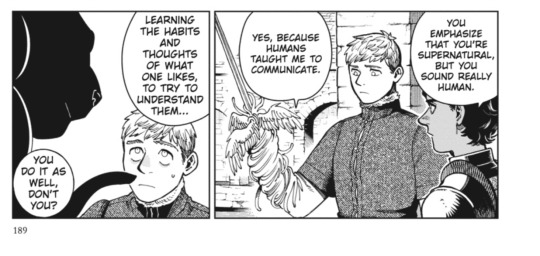
Kabru is a character who devotes a huge amount of time and effort to understanding people, and he is very good at it. In his internal monologue, we can tell how advanced and complex his skills of analysis are. He is able to read a huge amount of information just from looking at people's faces and body language.


People are, to him, what monsters are to Laios. This is something that's been expanded on at length in other, excellent meta. It's the fact that they're foils; it's the fact that Kabru is also very easy to read as autistic, with a special interest which is the opposite and parallel of Laios'. It's something that came out of trauma and alienation, as Laios' special interest in monsters also began as a coping mechanism.
The complicated origin of this "love" for monsters and for people comes through, I think, in the fact that one of the places we see both characters use their fixation is in being very, very good at killing the thing that they love. This also ties into the idea that loving something isn't even remotely mutually exclusive with using it to sustain your own survival; using it for your own purposes; hurting it or killing it. Love can be, and often is, violent, possessive and consumptive. This understanding is part of what makes Kui's depiction of interpersonal relationships so compelling to me.
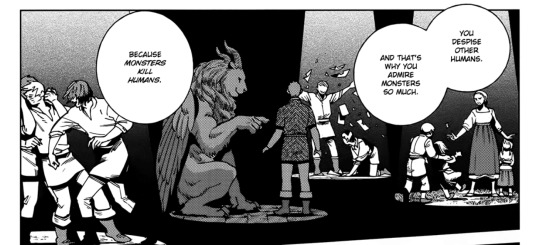
While Laios fixated on monsters and animals to seek a place of escape, in both his imagination and his self-image, from the humans who he couldn't understand and who couldn't understand him, Kabru seems to have fixated on understanding people in order to navigate the complex, socially marginal places that he has been forced into throughout his life. As an illegitimate child raised by a single mother with an appearance that marked him out as different to the point his father's family wanted to kill him, and a tallman child raised among elves who didn't treat him as fully human and wanted him to perform gratefulness for that treatment – treatment that, after he met Rin at age 9, he certainly always understood could be a lot worse – his ability to work out what people wanted from him, whether they were friendly or hostile or had ulterior motives, wasn’t just an interest. It will have been an essential skill.
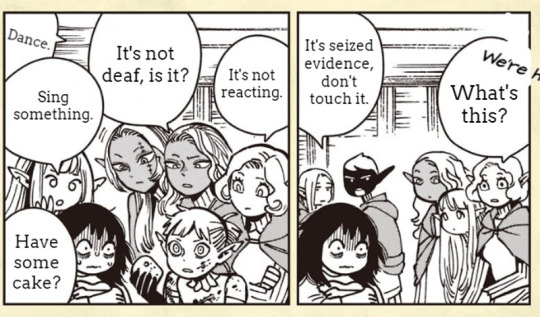
Milsiril, I think, was a flawed parent who tried to do her best by Kabru and did a lot of harm to him despite her best intentions. She may have treated him much better than an average elf would have, but like Otta and Marcille's mother, there are other elves with different outlooks on short-lived races. How would they judge her treatment of him? We don’t have any insight on what it could be, but to be honest, the person’s whose opinion of her I’d be most interested in knowing is Rin’s.
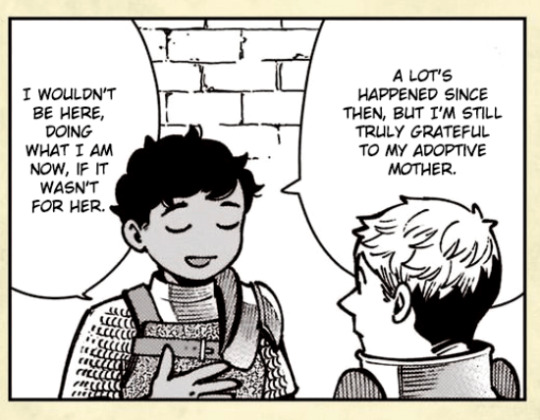
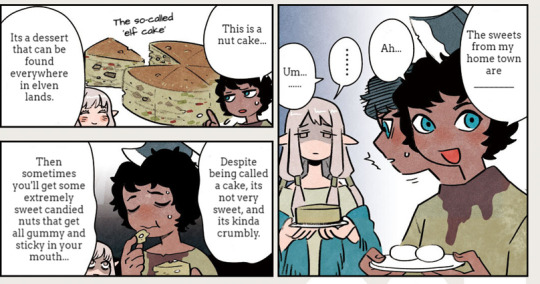
But even if she'd been perfect, living as an trans-racial adoptee in a deeply hierarchical nation with a queen who is a 'staunch traditionalist' who wouldn't even acknowledge the existence of a half-elf like Marcille (according to Cithis) is an experience that would deeply impact anyone.
Elves & Impossible mutual understanding
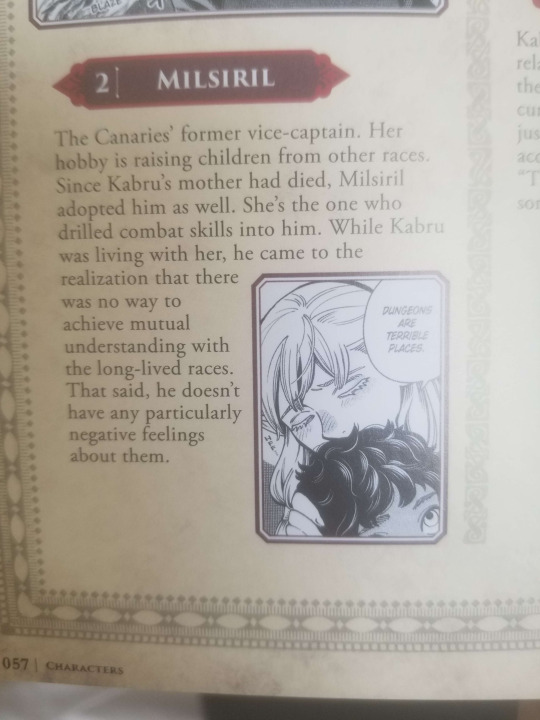
While Kabru was living with Milsiril - in other words, while living in the Northern Central Continent - he came to believe that "there was no way to achieve mutual understanding with the long-lived races."
This is evident in his political project: he wants short-lived races to have ownership over the dungeon's secrets. Despite his dislike of the Lord of the Island, he's a useful bulwark to stop the elves taking over. Despite his doubts about Laios, Laios needs to be the one to defeat the dungeon, because if he doesn't the elves will take over.
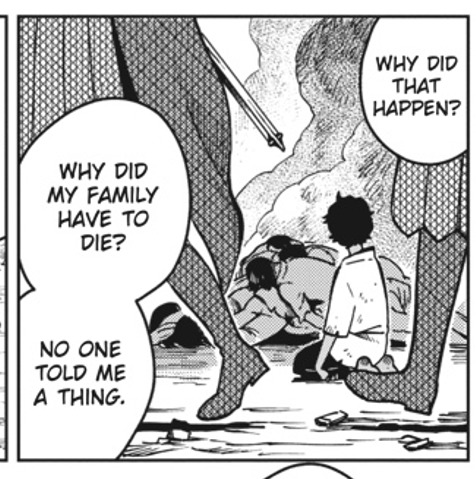
Kabru still carries a deep scar from Utaya, one that was exacerbated by the fact that he never got an answer to any of his questions about what happened or why. This, despite the fact that Milsiril knows about the demon and how it works. Do you think Kabru, with his social perceptiveness that borders on the superhuman, wasn't aware that she knew more than she would tell him?
Given that, the fact that he gets to a place where he "doesn't have any particularly negative feelings about [elves/long-lived species]" .... well, to put it bluntly, I believe that he thinks that's the case, but I kind of doubt it. After all, if he did have resentment, of Milsiril (someone who was his primary provider and caretaker since age six, and who despite her flaws, loves him and who I do think he loves) or of elves (who he has had to play nice with for most of his life, in order to survive, and will still have to play nice with in order to achieve his goals, since they hold all the power) what would that do except hurt him and make his life harder? Kabru is Mr. Pragmatic, so I don't think he'd let himself acknowledge any such feelings he did have. Exactly because he can't acknowledge them, they're well placed to get internalised as beliefs about the Fundamental Unchangeable Nature of the World.
However, these stated beliefs seem to contradict his actions. Despite his belief in the impossibility of forming a mutual understanding, he certainly seems to try to understand long-lived people, just as much as he does short-lived people. There's no noticeable difference between his treatment of Daya & Holm versus Mickbell & Rin that isn't clearly down to their relationship with him. His skills of human analysis were honed and developed while living amongst elves, and as soon as he's alone with Mithrun he immediately sets to understanding him - his interests, his motivations, his needs, and his past.
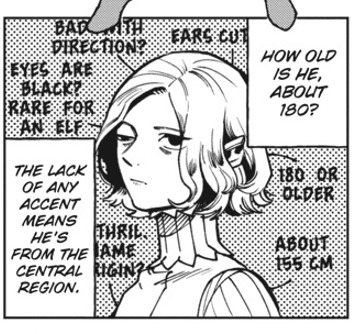
He treats him considerately and without bias, and despite the fact that Mithrun conquering the dungeon for the elves is both a reenactment of a core part of his childhood trauma and a political disaster for his aims, that doesn't seem to colour his perspective on Mithrun negatively at all.
This is something I find extremely laudable about Kabru, and it's another way he parallels Laios. He seems to understand that people, as a rule, (in Laios' case, he understands this about monsters - and eventually, all living beings) will act in their own interests, and if those interests conflict with yours, might harm you. But that's just their nature, and it's not something that should be held against them; you're also doing the same thing, after all. The crux of Laios' arc is precisely that he has to accept the responsibility of hurting someone else in order to achieve what he wants.
Kabru is deeply concerned with his own morals, what he should and shouldn't do, but mostly in the context of responsibility for the consequences - a responsibility he takes onto himself. He isn't scrupulous about what he needs to do in order to create the outcome he wants, but if he fails to create that outcome, then....
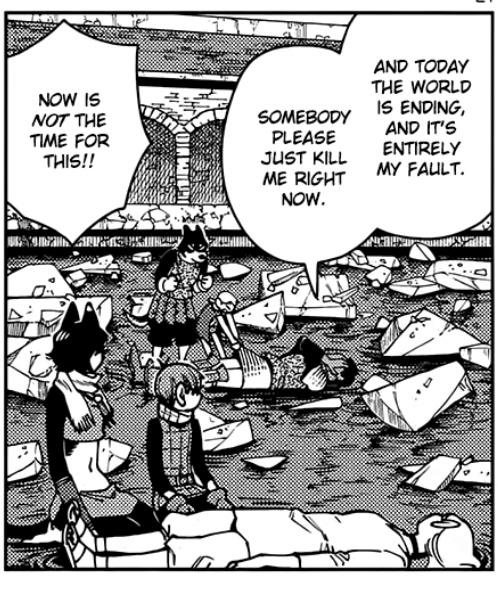
He blames himself to the point of thinking he should die. He doesn't blame Laios, or seem at all angry with him, despite concluding he should have killed him to prevent this outcome. That's because in his eyes, ultimately Laios was going to act according to his own nature, and it's Kabru's fault for not understanding that nature well enough. He's extremely confident in his ability to understand and predict others, (including elves and other long-lived people). Then, where does his conviction that mutual understanding is impossible come from?
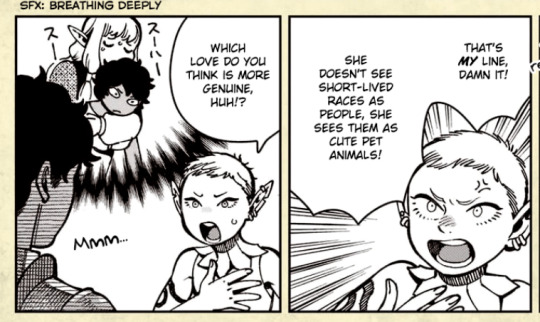
Partially, it's the "mutual" part. I'm sure Kabru, who isn't able or willing to deny Otta's insinuation that Milsiril saw him more like a pet than a son, has felt that his full interiority, the depth of his feelings and his ability to grow, act, and think as a fully equal being, was something that the elves around him just couldn't grasp. Because that was their excuse for it, he came to understand this as a gulf between short-lived and long-lived beings, an inevitable difference in outlook caused by their different lifespans.
This experience might be part of what leads to his iconic “fake” behaviour. He trusts his ability to understand others, but if they aren’t able to understand him, then there isn’t any benefit to being honest about his feelings and thoughts. If his attempts to reach mutual understanding with his caretakers were never able to be fulfilled, then it isn’t any wonder that he reacts with such surprise and horror at blurting out his desire to be Laios’ friend.
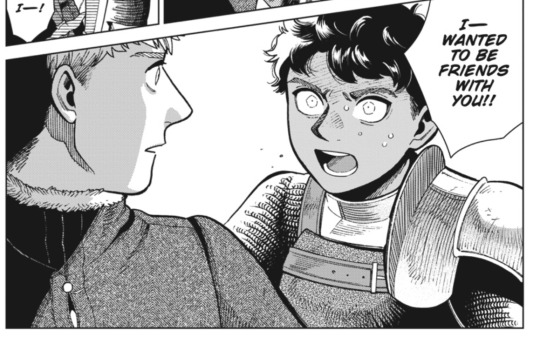
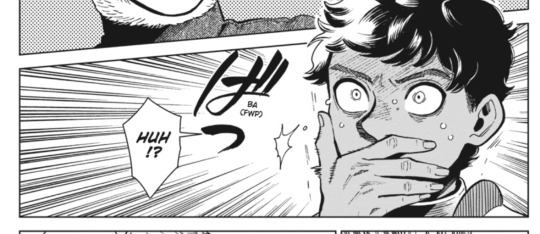
In his experience, making yourself vulnerable in that way only leads to being hurt. Soothing him, hushing him, lying to him, talking to him like a child that isn’t able to use proper judgement – that’s an inadequate and deeply hurtful way to respond to genuine distress, the desire for autonomy, or disagreement. Ultimately, I think that’s why he comes out on the side of being grateful to Milsiril; because she did equip him with the skills and knowledge he’d need to reach his goal, and let him go.
Though he could understand them, they couldn't understand him. To the extent that was true - which I'm sure it was - it wasn't due to anything about lifespan. It was due to the elves’ racism, and the solipsitic mindset & prejudiced attitude that it caused them to approach him with.
Because, if it needs to be said, the idea that there is an unbreachable gap in understanding between the long-lived and short-lived species is not true. Marcille and Laios have a much greater difference in lifespan than any full elf from any short-lived person, and they’re able to understand each other – maybe not perfectly, but better than many other people who are closer in life-span to them.
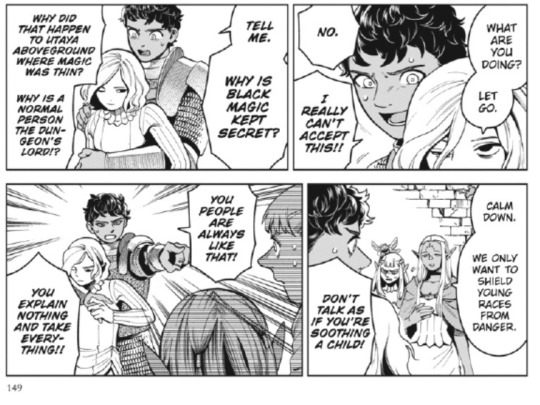
That doesn’t mean that I think Kabru is wrong about this, however. Because there’s an interpretation of his statement that is reflected in his actions and is true. When he talks about his problem with elves, it’s not just their attitudes: it’s their power, and what they use it to do. They “explain nothing and take everything”. Though it’s presented in the guise of ‘guiding and protecting’, in fact it’s a simple case of a powerful nation using their military power, wealth, access to resources, and historically stolen land – including the island itself – to protect their own interests and advance their own agenda. That’s why they’d be able to show up, seize the dungeon, and forcibly take Kabru’s party and Laios’ party to the West. If Kabru wants to stop that from happening, or change that status quo, persuasion or a bid to be understood would be completely pointless. Between the political blocs formed by long-lived species and the interests of short-lived species, “mutual understanding”, given their current, unequal terms, would be impossible. This is something that we see reflected in Kabru’s actions; before he asks his questions about the dungeon, he grabs Mithrun as leverage. He never really attempts to persuade the canaries to see his point of view, because that would be pointless: they’re agents of the Northern Central Continent’s monarchy, and will act in its interests regardless of any individual relationship with him.
I don’t think Kabru sees the different dimensions of this belief of his in quite such clear terms, however, as is evidenced by the other group who he thinks it’s impossible to communicate with.
Demi-Humans & Unknowable Objects
The other place that we see his conviction about the impossibility of mutual understanding is in the kobold extra.
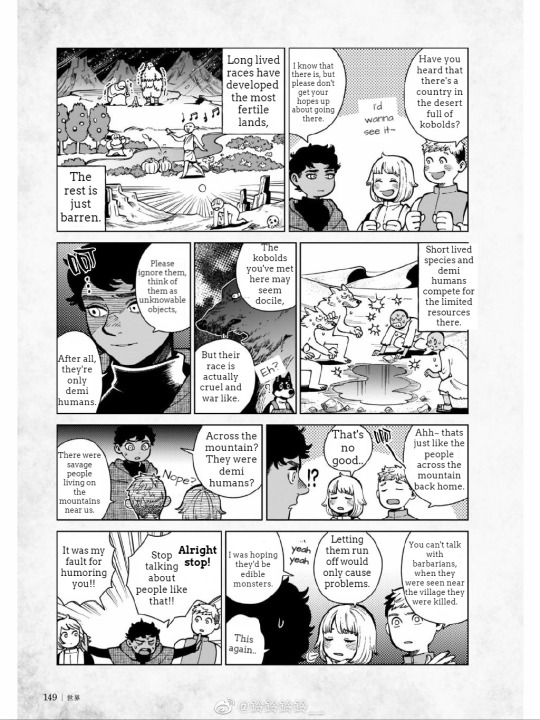
I'm including the whole thing, because I think it's an excellent and clever piece of world-building. Aside from what it says about Kabru, which I'll expand on shortly, what this extra does is deconstruct and call into question the usual "fantasy ontological biology" present in these sort of DnD-like settings. Essentially, the kind of worldbuilding where a race (such as kobolds) can be described as war-like, and that's establishing something essential about their biological nature. That's common to the point that if Kui didn't include this, some people would probably come away thinking that's the case about, e.g., the orcs.
But here, despite what Kabru is saying, the information the reader actually gets is:
the conflict between short-lived humans and demi-humans such as kobolds is mostly over access to material resources that they need to survive.
These resources are scarce because powerful nations, such as the elves, have monopolised them.
Kabru, who has grown up in a place at the centre of these conflicts, ascribes essential, negative traits to a cultural group which was in direct conflict with his own. Communication with this other group is impossible; they aren't people, they're more like objects.
oh yes! just like this conflict between groups of tall-men, a conflict which the reader will immediately interpret as more clearly analogous to real-life racism. Our other protagonists also carry prejudices from growing up in a place where a marginalised group was in conflict with the dominant group over scarce resources. It's definitely impossible to communicate with these people, and you can only kill them.
Woah, when you say it like that, it sounds pretty bad!
But also, nobody walks away having had a realisation or unlearned their prejudices - because they don't have the tools they need to do that work. Yet. I do think, to an extent, it could happen - especially with Kabru, since it's suggested in the epilogue that Melini might become a safe-haven for demi-humans.

To focus in on Kabru, the key here is his statement that you should think of demi-humans as "unknowable objects". Even his extraordinary powers of understanding have seemingly hit a limit. Part of this is just inherited prejudice, and doesn't need to have a complicated psychological explanation, any more than the elves who were prejudiced against him need one.
But also... this is probably somewhat linked to the way demi-humans seem to be considered "pseudo-monsters". They're the place that the strict delineation between the human and the monstrous is permeated. Laios, who is not interested in humans, remembers and is excited by Kuro. Chilchuck and Laios argue over whether it's OK to eat a mermaid. Kabru's prepared to (pretend to) roll with the idea that Laios ate the orcs.
But these are people, aren't they? Of course, this is a social construction, as we see from the fact that in the Eastern Archipelago, the label of "human" is reserved for tallmen, but in most of the rest of the world it depends on some obviously arbirary classification based on number of bones; "demi-humans" aren't in any essential way monstrous, except to an extent in their appearance, and physical location - due to their marginal social status, they're pushed out to live in unsafe places such as dungeons.
Therefore, Kabru's view of demi-humans as fundamentally "other", unable to be understood - monstrous - could be read as akin to abjection, the psychoanalytical concept described by Julia Kristeva. In order to create a bounded, secure superego, that thing which permeates and calls into question the border between self and other, human and animal, life and death, is rejected and pushed to the margin.
“Not me. Not that. But not nothing, either. A "something" that I do not recognize as a thing.[...] On the edge of nonexistence and hallucination, of a reality that, if I acknowledge it, annihilates me. There, abject and abjection are my safeguards. The primers of my culture.” (Kristeva et al., 1984, p. 11) “It is thus not lack of cleanliness or health that causes abjection but what disturbs identity, system, order. ” (Kristeva et al., 1984, p. 13) “The pure will be that which conforms to an established taxonomy; the impure, that which unsettles it, establishes intermixture and disorder. [...] the impure will be those that do not confine themselves to one element but point to admixture and confusion.” (Kristeva et al., 1984, p. 107) (discussing food prohibitions in Leviticus)
This is both (due to its affinity with food-loathing and disgust) a very fruitful concept to apply to dunmeshi, and a psychoanalytical theory which I wouldn't exactly cosign as True Facts About Human Psychological Development. You may also know the abject from its utilisation in the classic essay "Horror and the Monstrous-Feminine" by Barbara Creed - that's a lot more approachable than Kristeva if anyone's interested.
Key here, though, is that through the symbol of the "demi-human" is embodied a step between "human" and "monster" - and that's a prospect that puts at risk the whole notion of an absolute separation between those two categories in the first place. To Laios, that's something wonderful, and to Kabru, it's terrifying. We can see this principle further embodied in the relationship both characters have with the notion of becoming monstrous.
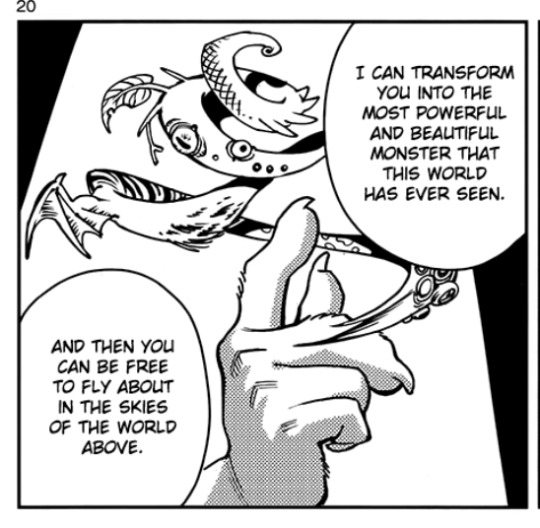
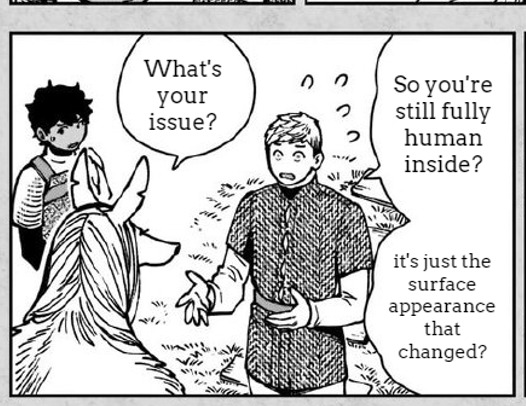
To Laios, this is transcendent, and represents a renunciation of everything human - in fact, if it didn't, it wouldn't "count".
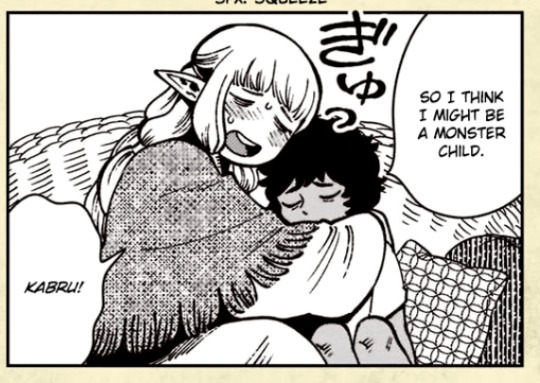
To Kabru, it's a deeply-held fear, established by his childhood alienation (due to his illegitimacy, his eyes, and perhaps also his neurodivergency), deepened by monster-related trauma and the sense of responsibility and survivors guilt he feels for what happened at Utaya. His identity as a human who is not monstrous is key to his sense of stability and safety; he doesn't want to touch monsters, he doesn't even want to see them.
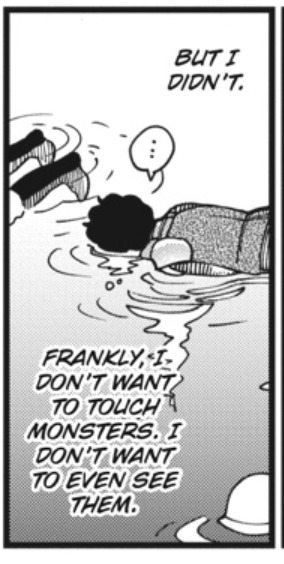
To acknowledge a kinship, a possibility of similarity between the things he loves (humans) and the things he hates (monsters) would be more than touching them - it would be putting them inside him. We know, quite explicitly, that this notion is triggering to Kabru. He literally has what seems to be a flashback when he's about to eat the harpy omelette.
So he abjects it, classifying the demi-human as fundamentally unlike him - an unknowable object, or an object that he refuses to know. Because in understanding it, he would interject the things he hates and fears into his self, which is already, always under threat by that hated and feared object.
Of course, again, Kabru isn't very good at enacting this refusal in practice. For one, when he chooses between his desires and ingesting the feared object, eating monsters... he eats monsters. Part of this is treating himself badly, the "ends justify the means" mentality. His goal is to destroy all monsters, so if he needs to become monster-like to do that, he will. But part of it is also the other motivation that he didn't even seem to know about until he said it: he wants to become Laios' friend, and to learn from him how a person can like monsters. He wants, at least in some part of him, to reconcile the feared and hated object into something he can understand.
For another:
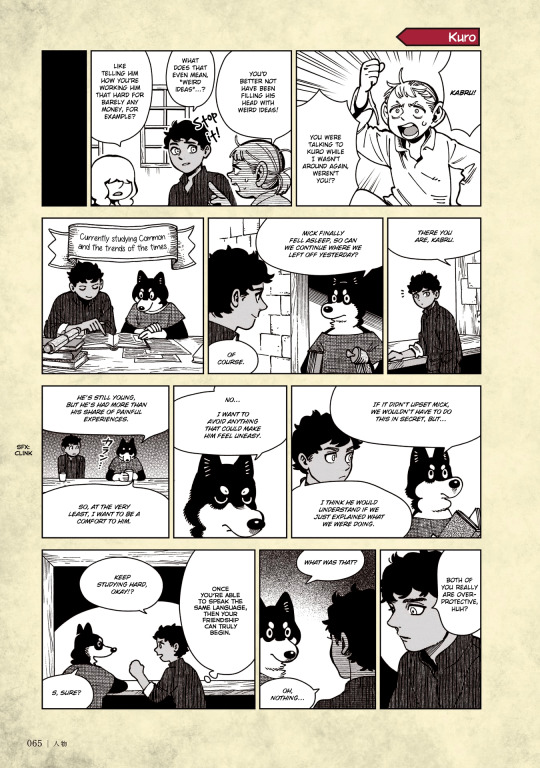
Kabru can speak the kobold language. In the first place, while this may have been common in Utaya, it also could have been something he chose to learn, an early expression of his interest in understanding and talking to all sorts of people. It isn't the kind of thing you learn if you believe that communication between yourself and the group that speak it is impossible, is it?
It's possible to harbour prejudices against a group while being kind to an individual, and given Kabru has those prejudices regardless of his reasons, that is what he is doing. But also, his treatment of Kuro doesn't reflect a sincerely held belief that he's an "unknowable object" at all. His approach is exactly the same as it is to any other person: an analysis of goal and motive, and an attempt to help if he's sympathetic and their goals align - going out of his way to give language and local knowledge lessons in secret. His conviction that Mickbell and Kuro will truly become friends when they can properly communicate is completely contradictory to any sense of demi-humans as fundamentally different, or impossible to reach mutual understanding with. To me, it seems like this self-protective shield against the corruptive force demi-humans as an idea present to his identity, this abjection, when Kabru is face-to-face with one, just simply can't hold up against his finely honed skill of intellectual empathy. Perhaps because he's autistic, it seems his "empathy" is less an emotional mirror response, and more a set of cognitive skills for analysis of others. That instinctual, emotional empathy might not trigger when presented with a member of an out-group, but if it’s possible for Kabru to turn his cognitive empathy off, we don’t see him do it.
This isn't to say that this prejudice doesn't affect his behaviour. For one, it could negatively impact his judgement of politics and policy, where individual people don't enter into it. For another, I'm not convinced he'd be willing to overlook Mickbell's exploitative relationship with Kuro if Kuro wasn't a kobold. As it is, since both of them are satisfied, he doesn't feel like he needs to intervene, regardless of the fact Mickbell isn't paying Kuro. But if Daya and Holm were in a relationship, and Holm took both Daya's and his own share from their ventures, but only compensated her in living expenses and kept the rest, do you think he'd tolerate it, for example? Even if she said it was OK?
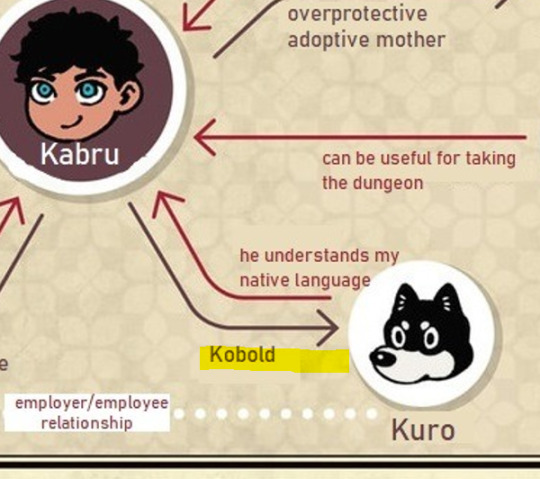
Conclusion

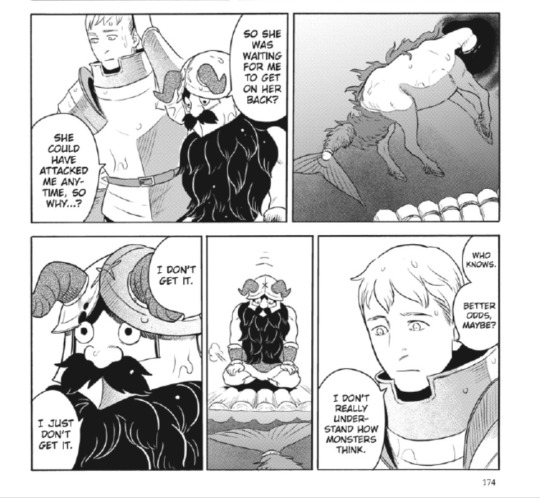
The kelpie chapter establishes that "people can never know what monsters are really thinking." That isn't just true of monsters, though.
True mutual understanding is impossible - between anyone. We can never truly understand another person's heart. This is touched on in, for example, the existence of shapeshifters and dopplegangers. Even a monster that seemed like a perfect copy of a person wouldn’t be that person, and wouldn’t be a satisfactory replacement.
We’re intended, I think, to understand the winged lion's repeated suggestions to just replace people who have been lost with copies as something uncanny, which demonstrates the way that the winged lion never manages to attain a complete understanding of humans. A version of a person who was created to fulfil your memories of them, to be the person who you wanted them to be, would be a terrible, miserable thing.
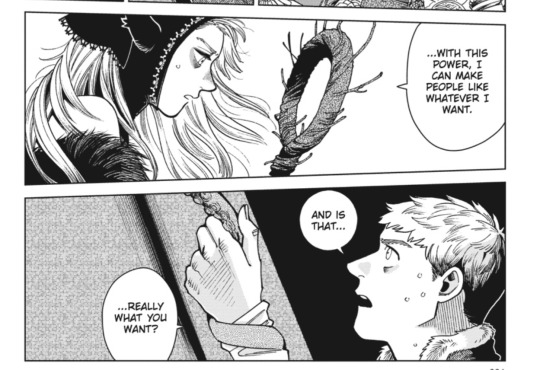
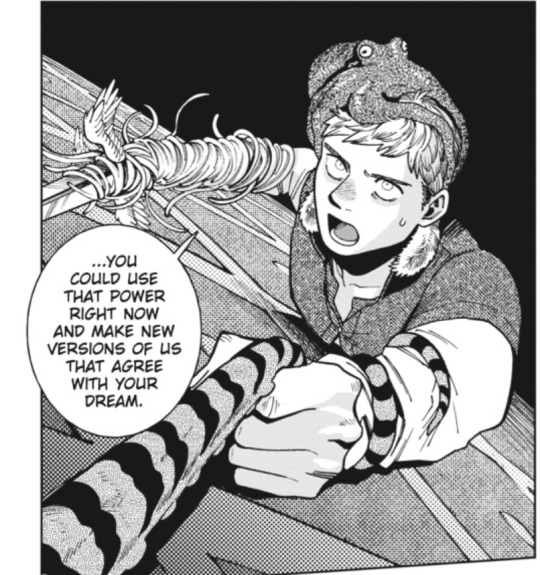

Disagreeing, coming into conflict, and misunderstanding each other, are essential parts of what it means to be living beings, as fundamental as the need to eat.
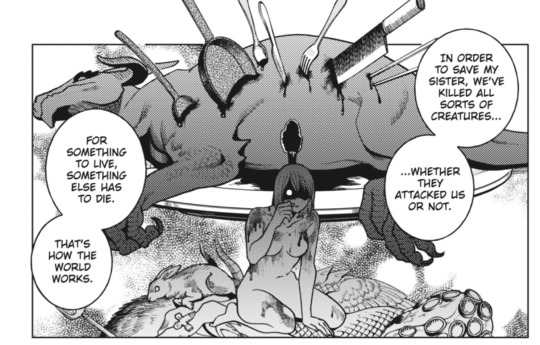
The only thing to do is not to take more than you need to eat to survive, and not impose your own desires onto others. To do your best to sincerely communicate your desires, even if they're embarrassing or vulnerable or strange, like Kabru eventually does with Laios; like Laios does, bit by bit, with the people around him; like Marcille does, Chilchuck does, Senshi does... to hope they will accept you, and do your best to understand them in return.
We can re-examine, in that context, Kabru's line about the elves' tendency to "explain nothing and take everything".
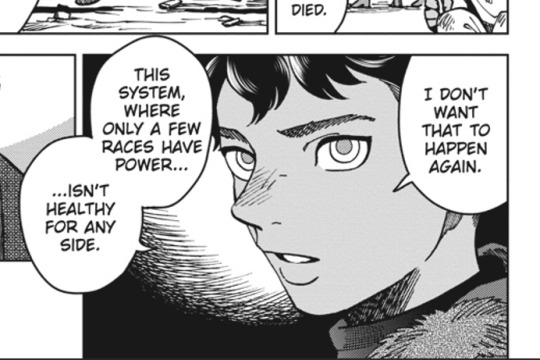
They have the power to impose their preferred "menu" onto less powerful groups. And in that context, mutual understanding being impossible just means that they won't give up their power because they're asked nicely. Kabru's goal is to seize the truth that they won't give to him, and to create a situation where they can't take everything. Because he's accurately surmised that nothing about the treatment of short-lived races will change so long as the power imbalance remains. Despite the way he mistakenly ascribes part of that to "long-lived vs short-lived" or "human vs demi-human", the actual gulfs in understanding he identifies are structural, are about power and about access to material resources and safety.
I think he could come to recognise this. Yaad is teaching him political science after all, and while a prince's lessons on political science won't exactly get at much that's radical or invested in the interests and perspectives of the marginalised (Capital is a critique of for a reason after all...) I believe in Kabru's ability to learn critically and get more from a lesson than it was intended to teach.
#og post#kabru of utaya#kabru dungeon meshi#laios touden#dungeon meshi meta#dungeon meshi#dunmeshi#dungeon meshi manga spoilers#dungeon meshi analysis#kuro dungeon meshi#the canaries#milsiril#continuing to develop my kabru theses.#literally sitting and thinking about kabru all day. rotating him.#he's in the microwave. to me.
2K notes
·
View notes
Text
I'd say where the dissonance really starts, when it comes to the portrayal of the Jedi in more recent Star Wars stories, is the perception of what the Prequels are about.
They're not about the Jedi.
George Lucas said over and over that they're about:
How a democracy turns into a dictatorship, we see this in the background of the films, as the Republic descends into becoming the Empire.
That first theme is then paralleled with a second theme: how a good kid becomes a bad man. We see this in the more character-driven and personal exploration of Anakin’s fall to the Dark Side.
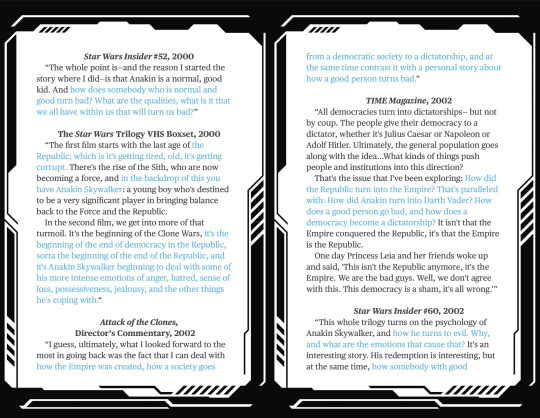

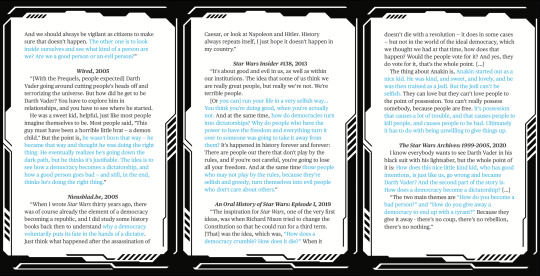
The Prequels’ focus is on Anakin and the Republic, these films are not primarily about the fall of the Jedi. In fact, I’d argue they aren’t about the Jedi at all!
And when you look at the original backstory, you’ll notice that it also primarily focuses on:
The political subplot of the Republic’s downfall and Palpatine becoming the Emperor.
Anakin’s turn and his betrayal of the Jedi.
So, there too… the Jedi themselves aren’t really that big a part of the Prequels’ original idea. They aren't mentioned much, beyond their trying to save the Senate and getting wiped out.
The Star Wars movies aren't about the Jedi, they're about Anakin and Luke, they're about Obi-Wan and Padmé and Han and Leia, the Rebellion vs the Empire, the fall of the Republic.
They're not about Ben and Yoda and Mace and Ki-Adi and Plo Koon and Shaak Ti and Luminara.
Just like Harry Potter isn't about Dumbledore and McGonagall. Just like the Lord of the Rings isn't about Gandalf.
On a functional level, the Jedi are:
POV characters who witness the events unfold with their hands tied, they're our anchors, whose eyes we see through to see democracy crumble into dictatorship.
Embodiments/vectors of the message George Lucas wanted to get across through these movies, which is the conflict between selfishness & selflessness, greed & compassion (Sith & Jedi).
But that's about it.
However, if you ask today’s fans and Star Wars creatives, most will say the Prequels are about the fall of the Jedi Order.
This is a take shared by a big chunk of the fandom, including various filmmakers, authors, and executives involved with Star Wars, so much so that the time period the Prequel films cover has now been redubbed by Lucasfilm as the “Fall of the Jedi era”.

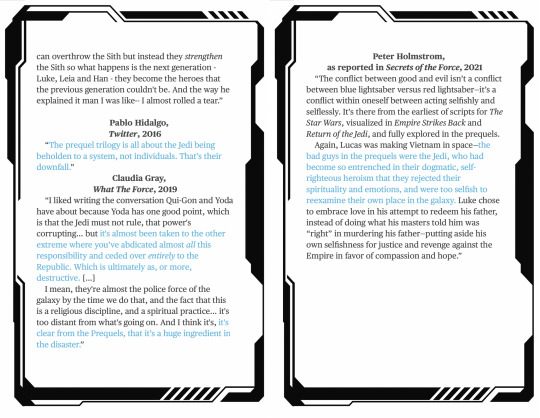
Which leaves us with a question... why? Why the dissonance?
My guess? It's because the Jedi are cool. They're awesome.
And deep down, they wanted the Prequels to be about the Jedi. About the Jedi Knights at their height, errant warriors like the Knights of the Round Table.
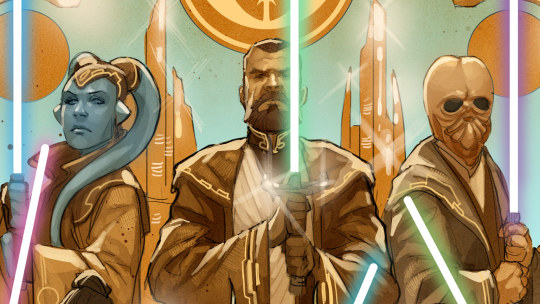
And they didn't get that. They got a bunch of diplomats serving a political institution. And that didn't make sense, right? That's not what they expected so it's bad. And it's Star Wars. It's Lucas. It can't be bad, right? So like... what were they missing?
Oh... wait... what if... that's the point? That the Jedi were supposed to be Knight Errants and being guided by the Force instead of like - ew - space ambassadors for the Republic. Yeah now it all makes sense.
The Jedi in the Prequels aren't what we wanted them to be and that's their failure! Like, it's not just that I didn't like them because they weren't likeable to me, it's that I'm not supposed to like them because the narrative totally says so--
-- it doesn't.
The Jedi preach and practice the same Buddhist values as George Lucas, mirroring what he says in interviews almost verbatim.
The relationship between Obi-Wan and Anakin/Qui-Gon mirrors the dynamic between Lucas and Coppola.
The designs of the Jedi and their temple had to be toned down because they looked too bureaucratic and systemic.
This is Lucas we're talking about. "On the nose" is his middle name. He named the drug-peddling sleazebag "Elan Sleazebaggano." He ditched an elaborate introduction of General Grievous in exchange for just "the doors slide open, in walks Grievous and he's ugly."
If he had really been hell bent on framing the Jedi as elitist squares who lost their way and were mired in bureaucracy, he would've made them and the Jedi Temple look like the authorities in THX-1138.
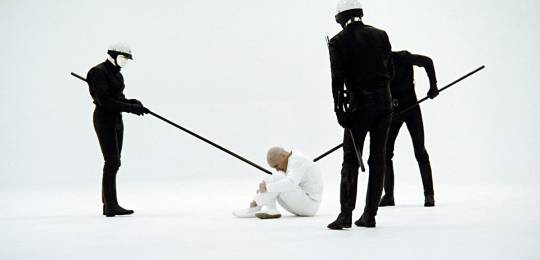
They weren't likeable to some fans because, well, they weren't developed or shown as much as someone like Anakin. Because it's not about them. It's not their story. It's Anakin's. It's Luke's. It's their respective friends'. Or maybe it's an adversity to "perfect goody two-shoes" characters (which the Jedi are not). But hey, it's a movie for kids. Some 2-dimensionality is forgivable.
Bottom line, had more time been spent on the Jedi, had Lucas made the Prequels into a limited show and give them a whole subplot, had he decided to do away with the 30s serial dialog and let someone else write the dialog, maybe the reception might've been different.
But that's what we got. And guess what it's fine.
It's more than fine, it's fucking awesome.
I proudly and confidently say that I love the Prequels, with and without The Clone Wars.
I love my space monks, I love that they're diplomat wizards, I love that there's such a variety of them, I love that Mace is a no-bullshit guy who genuinely cares about his fellow Jedi and how screwed the Republic is, and Yoda is wise and kind but also a gremlin weirdo who'll embarass you in front of a classroom full of kids, and Ki-Adi has a penis for a head, is constantly calm and yet goes down like a champ even though they take him by surprise. I love that Shaak Ti can kung fu an army full of Magna Guards and still have the energy to charge at Grievous. I love that Obi-Wan is a sass machine who is also hilariously oblivious to the fact that he's just as terrible as Anakin.
They're awesome even if they're not perfect. They're awesome because they're not perfect.
But the movies are not really their story.
They're Anakin's. They're Luke's. They're the Republic's and the Rebellion's. And the fight against a space Nazi emperor/empire.
1K notes
·
View notes